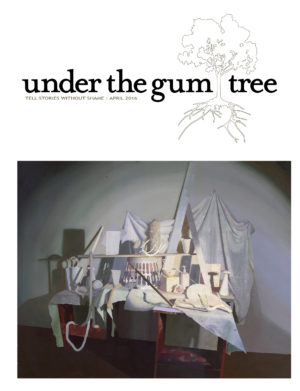Hollie Dugas

Hollie Dugas is living in New Mexico. When she is not writing poetry, she critiques novels in the making and conducts a small writing workshop. Hollie has a knack for making language delicate. Her work was most recently selected to be included in Cactus Heart, The Common Ground Review, Adrienne, Folio, IP, and Tulane Review. She is currently a member on the editorial board for Off the Coast.
When did you start writing and why? What inspires your writing now?
Some of my favorite memories are sitting next to my father in the evenings after school and listening to him play the guitar and sing old Bob Dylan and John Anderson songs. I liked how genuine it sounded. I can still remember how profound I thought the music and lyrics were, how profound he became when he was playing them. It’s the first time I can remember being inspired and wanting to discover what writing meant.
I have always been deeply curious about what happens when I am not looking and how odd it is to be human. I think it started by writing when I wasn’t writing; it was with me like as small seed rooting in back of my head reaching for sun as I sorted through whatever else life was asking of me. Eventually, writing became something I had to do. I started putting words on the page, any words, and I realized that these words weren’t only about creation but, rather, something I was following like an inner map.
Your piece is a “Flash Feature.” How did you go about writing an impactful brief piece of nonfiction? How is it different than writing a longer piece?
The piece has an instructional tone but I wanted it to be a wild ride from start to finish, which is how it actually felt for me. I began the story at the last possible moment. No set-up. I like to think of it as jumping into a game of Double Dutch, the reader linked as soon as he or she hops in.
What makes this piece particularly impactful is the language; it’s highly emotional and the situation is delicate. In such a short piece, there isn’t much time to spend with the reader, so I wanted to manipulate the language to its furthest capacity.
With longer pieces, I find myself using prose that is only necessary as background information and, often, degenerates into expository filler, which is something I don’t always feel good about. However, when it comes to flash, I get the opportunity to make each sentence artful. In fact, it’s a requirement.
In your opinion what criteria does an event have to meet to make a decent subject for a creative nonfiction piece?
My ultimate goal is to express the sensation of an event. But, there are so many angles to look from when writing. Writers, we like to notice them all. The most interesting part about writing creative nonfiction is that emotion can be so powerful as to reshape how we experience an actual event into our own personal truth. In that, I can’t think of many events that would be off-subject as long as the occurrence stirs a passion in the writer. However, in turn, the writer must be able to transform the actual occurrence to recreate that same emotion in the reader.
Why did you choose to write in the second person, rather than in first?
Second person fit better with the instructional manual style language of the piece. Do this. Do that. Who is supposed to follow these orders? You are, dear reader.
The piece is highly personal piece and has tidbits that are particular to me and my situation but, still, I aimed to make it universal and didactic to keep YOU with me the whole time. I hope it worked.
What made you decide to write this piece in a “how-to” instruction manual style?
I wanted to compel the audience to feel like they were working on this relationship with me step by step. By supplying the reader with what seems like an endless number of short commanding sentences that sometimes contradict each other, I urge the reader to feel as frustrated and exhausted as I felt during this time. My intention was to establish a sense in the reader that signified that just because the end result was a rickety one, it did not mean that I didn’t sweat the assembly. It was my rickety result, all mine, and I wanted to convey a feeling of entitlement in all of the grief.
The piece has a satirical tone. How important do you think finding humor in tough situations is? How did humor help you get through what is described in the piece?
I think it’s impossible to feel one emotion at a time in the spectrum of emotions. My emotions are always and inevitably mixed emotions. When I wrote this piece, I was feeling extremely anxious. But, there were times when I did laugh at myself. When my friends read the piece they laughed too. Mostly, because the tone of the piece was incredibly indicative of myself at the time. I felt dreadful and intense, this way and that way. But, I made fun of myself, which deflected some of the anxiety. I didn’t want the piece to take itself too seriously. I’m not asking the reader to feel sorry about the circumstance. I’m saying . . . And isn’t it a little funny? That somewhere, in the slices of time, my older self now outside of this situation (for better or worse) is looking down at my younger self and laughing. And, there’s also that younger version of me laughing at the older me.
How do you incorporate your poetic voice in nonfiction prose?
How do I not? There is a sense of mystery in the poetic voice. Emily Dickenson said, “If I feel physically as if the top of my head has been taken off, I know that is poetry.” I work for that same effect when I am writing prose. I want heads to roll.




